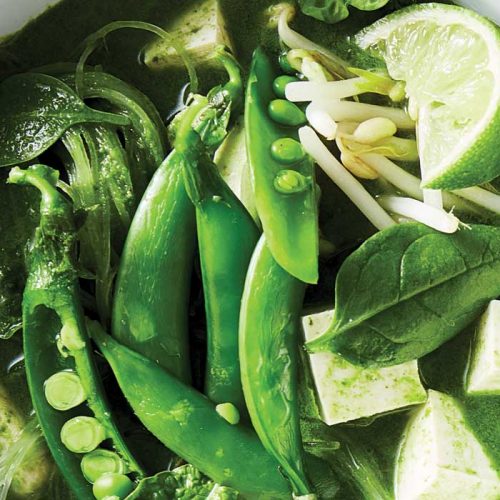
Women can be so busy looking after everyone else that their own health takes a backseat. Women’s health dietitian Melanie McGrice highlights how your food choices can have a big impact on your health.
From heavy periods through to those hormonal mood swings and hot flushes, it sometimes seems women get the short end of the stick. Plus, as our bodies change, we need a variety of different foods and nutrients to help us feel our best and give us the energy to live life to the full. The good news is — what you eat can help you manage many important womens health challenges.
The issue: Irregular periods
Possible reason: Polycystic Ovarian Syndrome (PCOS)
PCOS is a hormonal condition associated with irregular periods, high levels of androgen hormones and cysts on the ovaries. It affects one in eight women of child-bearing age and, unfortunately, almost 70 per cent of cases go undiagnosed. Common symptoms include irregular periods, weight gain, acne and facial hair. PCOS can also increase your risk of depression, type 2 diabetes and infertility.
The condition is most often caused by insulin resistance (insulin is a hormone used to digest carbs in our food). Fortunately, the condition is often treatable with a healthy lifestyle.
Eat more…
Low-glycaemic index (GI) foods (such as sweet potato, apples and yoghurt), small, regular meals and daily exercise can improve your insulin levels, which helps improve PCOS symptoms. Include some protein foods such as chicken, fish or nuts, and low-starch vegetables, such as broccoli, capsicum or cucumber at each meal.
Limit/eat less…
If you have PCOS, reduce your intake of foods that are high in sugar, and limit carb-rich foods like pasta or rice to one-quarter of your plate.
The issue: Difficulty falling pregnant
Possible reason: Endometriosis
Endometriosis is an inflammatory condition that affects one in nine Australian women. It’s a condition where cells similar to those which line your uterus are found outside the uterine cavity, and can cause severe menstrual pain, heavy periods and difficulty getting pregnant. There is currently no known cure, although the condition does go away after the onset of menopause.
Although researchers haven’t yet been able to determine the cause of endometriosis, they have found that foods that decrease inflammation and regulate estrogen levels may help improve symptoms.
Eat more…
Focus on eating plenty of fresh fruit and vegies to boost your antioxidant intake, and include good fats such as fish, avocado and extra-virgin olive oil to decrease inflammation. Make sure you’re consuming at least 25g of fibre each day to help your body eliminate any excess estrogen — so, leave the skin on fruit and vegetables, snack on nuts, and choose wholegrain cereals.
Limit/eat less…
To regulate your estrogen levels, you may need to avoid large quantities of phytoestrogens (plant-based estrogens) found in soy foods, so limit yourself to one soy latte or meatless soy burger per day. And avoid inflammatory saturated fats found in foods like chocolate, biscuits and chips. Alcohol also increases inflammation, so aim to keep it to a minimum.
The issue: Mood fluctuations and skin breakouts
Possible reason: Premenstrual Syndrome (PMS)
Premenstrual Syndrome is a combination of symptoms that some women experience in the ‘luteal phase’ (days 14–28) of their period. Symptoms may include headaches, bloating, moodiness, skin breakouts and cramping, but are relieved when your period starts.
Women with PMS are hypersensitive to their hormonal fluctuations during their menstrual cycle. It’s believed that PMS is caused by increasing levels of the hormone progesterone, provoking chemical messengers in the brain (called neurotransmitters). Many vitamins, minerals and essential fatty acids are involved in this process, which is why making dietary changes may help PMS.
Having underlying dietary conditions like diabetes, irritable bowel syndrome or food allergies can make a woman more prone to PMS.
Eat more…
A diet rich in foods containing thiamine and riboflavin has been found to decrease PMS, so eat plenty of wholegrain cereals, milk and legumes. Calcium and vitamin D have been found to help, so include two-to-three serves of dairy, such as milk, yoghurt or cheese, each day. Foods rich in omega-3, such as oily fish, flax and chia seeds, can also help PMS. A low iron or zinc intake may increase your risk of PMS, so ask your doctor to check these.
Limit/eat less…
Although you may crave alcohol, sugar and treats, research suggests these foods can actually make PMS worse, so try to limit your intake. It’s also important to note that it can take 3–4 months to see an improvement in your symptoms after changing your diet, so try to be patient.
The issue: Stubborn belly fat
Possible reason: Menopause
Menopause marks the cessation of menstruation and may result in a range of symptoms including hot flushes, insomnia, vaginal dryness and weight gain. These are caused by your body producing less estrogen, which causes a cascade of hormonal changes.
Most women find their periods come to an end between 40 and 58 years of age, with the average being 51 years. It’s almost impossible to predict how severe or prolonged your symptoms will be. Each of us will experience menopause differently.
Eat more…
Focus on fish to provide healthy omega-3 fats — and whole grains, nuts and vegetables for fibre — to counteract increasing cholesterol levels. The recommended number of serves of dairy foods increases from 2.5 to 4 after menopause in order to provide protein and calcium to help prevent osteoporosis.
Limit/eat less…
You don’t need as many kilojoules after menopause — so start by reducing your portion sizes. Keep treat foods, such as alcohol and biscuits, to a minimum, to help keep your kilojoule intake down. As you will no longer be losing iron when you bleed each month, your iron requirements decrease, meaning that you will no longer need to eat as much meat.
The issue: Uncomfortable bloating
Possible reason: Irritable Bowel Syndrome (IBS)
IBS is a gastrointestinal disorder which causes bloating, cramping, passing wind, diarrhoea and/or constipation. It is thought to stem from increased nerve sensitivity around the gut and irregular muscle contractions in the bowel wall.
Elevated levels of depression and stress often can exacerbate the condition, so in addition to looking at dietary strategies, it’s also important to consider your psychological health.
Drink more…
Water. Bloating can often be exacerbated by IBS-related constipation. A shortfall of fluids can result in harder, constipated stools. If you
have IBS-diarrhoea, you will be losing fluid in your motions, leaving you dehydrated and exacerbating the diarrhoea/constipation cycle.
Limit/eat less…
Foods rich in ‘FODMAPs’ can exacerbate IBS symptoms, so if you have been diagnosed with IBS, your doctor or dietitian may recommend a low-FODMAP diet. Common culprits include garlic, onion, lentils, mushrooms, apples, cauliflower or wheat.
Key nutrients women need
Our nutritional needs change throughout our life. Focus on these key nutrients at each life stage:
Adolescence
Calcium is essential in your teens and 20s as you build your ‘peak bone mass’. After you’ve reached this peak, calcium will continue to be lost from your bones through the rest of your life. Dairy foods such as milk, yoghurt and cheese are some of the richest sources of calcium, so enjoy a smoothie or glass of milk each day. Add some cheese to a sandwich, and enjoy a tub of yoghurt as an easy go-to snack.
Iron Now that you’ve begun menstruating, you’ll need more iron than before. You can boost your iron intake by including lean red meat 3–4 times per week.
Adulthood
Vitamin C is important to help maintain a healthy immune system. Potatoes, citrus fruits and green leafy vegetables are some of the richest food sources of vitamin C.
Vitamin D is a fairly common nutritional deficiency in adults. Not only is it essential for healthy bones and muscles, but emerging research now suggests that it may help to reduce the risk of diabetes and excess weight gain. Boost your vitamin D intake with eggs a few days each week.
Trying to conceive
Folate becomes essential for building your baby’s neural tube (brain and spinal cord), which will occur even before you know you are pregnant. Start a folic acid supplement and ensure you eat some green leafy vegetables such as broccoli or kale each day.
Iodine You’ll also want to boost your iodine stores before you conceive, so include bread, seaweed or fish in your diet.
Omega-3 is great for egg health, so in the three months leading up to conception, include oily fish like salmon or sardines in your meal plan three times each week.
Pregnancy
Folate continues to be very important throughout the first trimester of pregnancy, so ensure that you continue to include plenty of green leafy vegetables in your diet. If you can’t stomach them due to morning sickness, try a green juice instead.
Iron Your iron needs skyrocket during your second and third trimesters as your baby grows. Ensure that you are meeting your iron requirements by including lean red meat on your plate 3–4 times per week.
Vitamin D Researchers have found that vitamin D plays a particularly important role during pregnancy. It helps you reduce your baby’s risk of developing a range of conditions, including food allergies and asthma.
Menopause
Calcium requirements soar from 1000mg per day to be 1300mg each day following menopause, so include an extra glass of milk, slice of cheese or tub of yoghurt in your meal plan.
Fibre is never more vital than after menopause, so make sure that you choose high-fibre foods such as oats or chickpeas, and snack on 30 grams of nuts each day.
Omega-3 fats Cholesterol levels will increase after menopause, which makes omega-3 intake increasingly important to decrease the risk of heart disease. The best source of omega-3 is fish, so include it in your meal plan 2–3 times each week.
Food that can help other common women’s health complaints
1. Hot flushes
Boost your intake of phytoestrogens (plant-based estrogens) by having a glass of soy milk each day.
2. Recurring thrush
Cut back on processed sugars from foods such as chocolate, ice cream or juice.
3. Sugar cravings
Try sprinkling cinnamon over a few tablespoons of Greek yoghurt.
4. Painful periods
Increase your intake of omega-3 by eating fish three times per week.
5. Tiredness/fatigue
Ask your doctor to check your iron and vitamin B12 levels.
6. Anxiety
Limit caffeine in coffee, tea and chocolate, and enjoy a calming herbal tea instead. If symptoms persist visit your GP.
30 per cent of women experience severe premenstrual tension, with 8 per cent enduring reduced quality of life
Article sources and references
- Australian Institute of Health & Welfare. 2019. Endometriosis in Australia: prevalence and hospitalisations. Canberra: AIHW.https://www.aihw.gov.au/reports/chronic-disease/endometriosis-prevalence-and-hospitalisations/contents/table-of-contents
- Digestive Health Foundation. 2010. Information about Irritable Bowel Syndrome.https://cart.gesa.org.au/membes/files/Consumer%20Information/IBS.pdf
- Hill et al. 2017. Controversies and recent developments of the low FODMAP diet. Gastroenterol Hepatol. 13(1): 36–45.https://www.ncbi.nlm.nih.gov/pubmed/28420945
- MoradiFili et al. 2019. Dietary patterns are associated with premenstrual syndrome: Evidence from a case-control study. Public Health Nutr. 1–10.https://www.ncbi.nlm.nih.gov/pubmed/31612836
www.healthyfood.com










